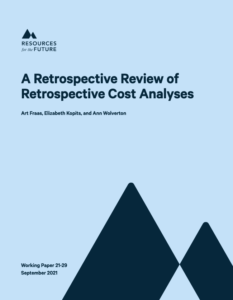Full Title: A Retrospective Review of Retrospective Cost Analyses
Author(s): Arthur G. Fraas, Elizabeth Kopits, Ann Wolverton
Publisher(s): Resources for the Future
Publication Date: September 14, 2021
Full Text: Download Resource
Description (excerpt):
Every administration since President Carter has initiated efforts urging agencies to reassess existing regulations. However, these reviews rarely involve ex post benefit-cost analysis of the original regulation and for the most part have not become institutionalized practice. Nevertheless, retrospective review can play an important role in revealing insights about the realized costs and benefits of rules, which may lead to modification, elimination, or strengthening of some regulations.
In this paper, we identify the main factors that drive differences between ex ante and ex post cost estimates. The paper reviews evidence from peer-reviewed studies of the realized costs of 13 significant EPA regulations to develop lessons for the design of future ex ante and ex post analyses of rules. Most of the retrospective studies address realized compliance strategies, though some also offer insights into specific elements of per-unit compliance costs. Only a few shed light on the total cost of the regulation studied. All the studies have data limitations, but in general, more insight was obtained when detailed facility-level data (e.g., power plants) were available. In spite of data and methodological limitations, as well as the narrow focus of some studies, we identify several common sources of differences between ex ante and ex post estimates. For example, these studies reveal that firms adopted substantially different compliance strategies than anticipated in ex ante analysis for nearly 70 percent of the regulations. Other key drivers of differences include reliance on engineering models, misspecification of the baseline, and failure to anticipate the role of new technologies.
